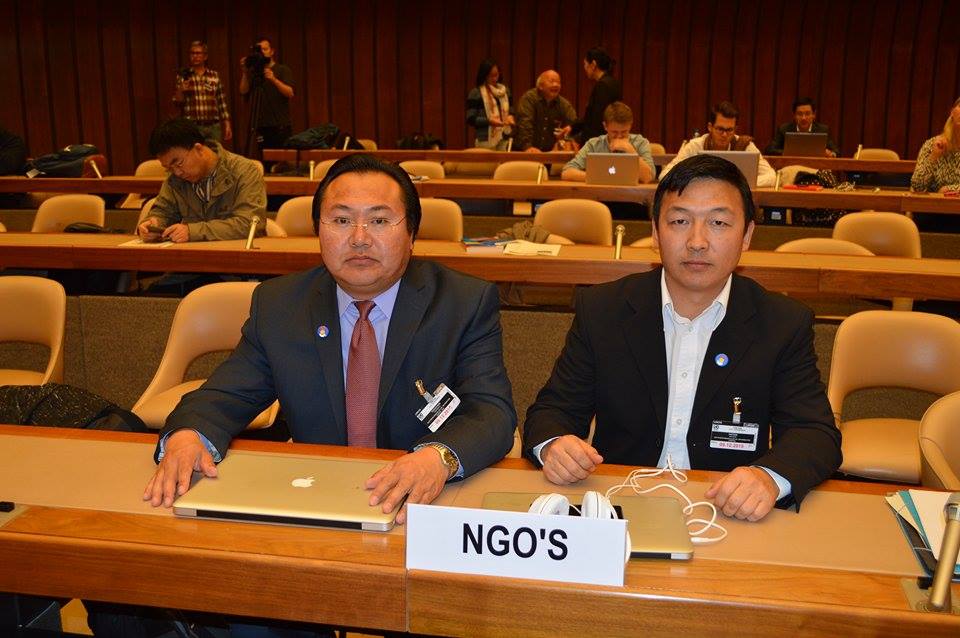| SMHRIC |
| November 21, 2015 |
| New York |

Enghebatu Togochog, Director of SMHRIC and Dolgion Hatgin, President of IMPP
Representatives from Southern Mongolian, Tibetan and Uyghur organizations
Joint Statement by Tibetan, Uyghur and Southern Mongolian organizations at the United Nations Committee Against Torture 56th Session
Gevena, 16 November 2015
Recommendations
Distinguished members of the Committee,
We would like to offer the following recommendations for the Committee to raise with China:
China must ensure prompt, impartial and effective investigations into all allegations of torture and into deaths in custody, particularly with regard to Southern Mongolians, Tibetans and Uighurs and follow through with prosecutions where relevant;
China must ensure that any measure to combat terrorism is in accordance with international human rights law, as Tibetans and Uighurs have been subjected to such measures in the past; it must reconsider the latest draft law on counter-terrorism;
China must ensure thorough investigations into cases of Mongolian herders who have been detained and tortured.
The following statements from Tibetans, Uyghurs and Southern Mongolians, highlight these distinct nationalities, rather than a single group of ďethnic minoritiesĒ.
Tibet Statement
Iím Padma Dolma representing Tibet groups, we are concerned about the spike in political imprisonment after 2008 and the widespread and systematic use of torture against Tibetans, in contravention of both Chinese and international law. Tibetan prisoners are treated in a discriminatory way and denied the safeguards set out in Chinese law, including contact with family and medical treatment, especially for injuries or conditions brought on by torture. We are concerned about reports of deaths in custody, in particular about the case of Tenzin Delek Rinpoche.
Tibetans are often brutally tortured, then released to die outside of prison so that Chinese authorities can avoid accountability, as in the cases of Goshul Lobsang and Tenzin Choedrak. We are concerned about the many Tibetan prisoners who remain at risk of torture, such as Bangri Tsamtrul Rinpoche. Torture contributes to a climate of fear and repression affecting every aspect of life and preventing Tibetans from realising their human rights, including the right to self-determination.
Uyghur Statement
Iím Peter Irwin from the Uyghur World Congress, the Uyghur community is critically concerned about documented cases of torture as well as a developing environment in which torture is practiced with absolutely no oversight as a particular result of counter-terror operations. China must ensure that all such measures are exercised strictly in accordance with international law and relevant Security Council Resolutions.
China has also failed to respond to direct requests from the Committee for information on torture cases involving Uyghurs following violence in July 2009 in Urumqi as well as torture allegations regarding Ilham Tohti as well as Ababekri Rehim who has been at risk since his detention in 2014 for passing information to overseas human rights groups and the media. The stateís obligation to conduct an effective investigation into these cases has been altogether ignored.
Southern Mongolian Statement
Iím Enghebatu Togochog from the Southern Mongolian Human Rights Information Center. We are concerned about the Chinese authoritiesí systematic persecution and torture against Mongolian dissidents, activists and their families. We are particularly concerned about the cases of political prisoners including Hada, Huuchinhuu and Batzangaa who have been subjected to cruel torture and inhumane treatment in prison, post detention and denied access to proper medical treatment.
We also would like to raise the cases of Mongolian herders who have been detained and tortured for defending their land. In the past year alone, at least 400 Mongolian herders were arrested, detained and tortured for defending their legal rights.
Thank you.





 Beyond
Great Walls: Environment, Identity, and Development on the Chinese
Grasslands of Inner Mongolia
Beyond
Great Walls: Environment, Identity, and Development on the Chinese
Grasslands of Inner Mongolia China's
Pastoral Region: Sheep and Wool, Minority Nationalities, Rangeland
Degradation and Sustainable Development
China's
Pastoral Region: Sheep and Wool, Minority Nationalities, Rangeland
Degradation and Sustainable Development The
Ordos Plateau of China: An Endangered Environment (Unu Studies on
Critical Environmental Regions)
The
Ordos Plateau of China: An Endangered Environment (Unu Studies on
Critical Environmental Regions)